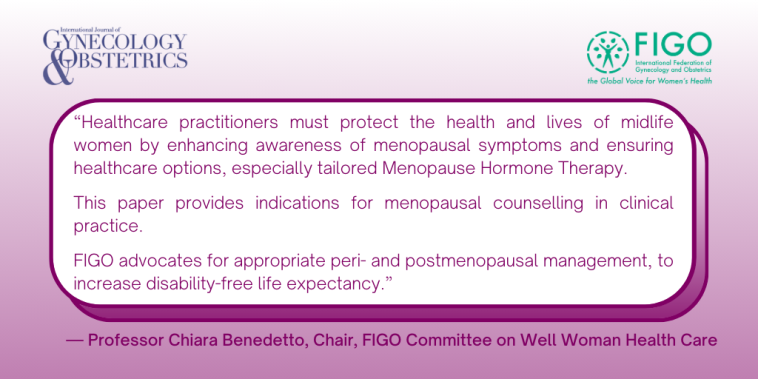New FIGO position paper on how to address the benefits and risks of menopause hormone therapy published in IJGO

FIGO and IJGO are pleased to announce the publication of “Counseling in menopausal women: How to address the benefits and risks of menopause hormone therapy. A FIGO position paper”. This paper was written by the FIGO Committee on Well Woman Health Care 2021–2023, and published in January 2024.
This FIGO position paper focuses on the benefits and risks of menopausal hormone therapy to provide indications that can be used in clinical practice for menopausal counseling, as well as insights into what FIGO considers best practice in peri- and postmenopausal healthcare management for women worldwide.
Menopause is an opportunity to raise awareness of women’s post-reproductive healthcare management. It presents a valuable opportunity for healthcare practitioners to increase awareness of symptoms, provide healthcare options, and promote healthy lifestyle habits. When menopause occurs, women still need to be able to fulfil their essential role in society and family settings, so counselling to better understand menopause, the benefits and risks of menopause hormone therapy, and lifestyle education is crucial.
Factors such as patient history, menopausal age, physical characteristics, and current health status must be taken into account when assessing the type and duration of menopause hormone therapy that should be administered. All menopausal women should receive regular health reassessment, especially if they are undergoing menopause hormone therapy.
FIGO’s position on menopause hormone therapy
FIGO recognises the need to further our knowledge and understanding of menopause and its management. FIGO, in its support of preventative medicine and the appropriate use of menopause hormone therapy, commits to the following:
- Educational interventions in primary care settings to improve physicians' knowledge of menopause, in order to prepare them in providing reassurance about symptoms and counselling on a healthy lifestyle and, where indicated, on hormone therapy to improve women's quality of life.
- Promotion of the study of menopausal medicine in the university medical graduate and postgraduate core curriculum programmes.
- Interventions to increase social awareness of menopause and its impact on women, to promote understanding in the home and work environments.
- Promotion of reimbursement policies for officially approved indications of menopause hormone therapy, which may impact healthcare costs for age‐related pathologies, including osteoporotic fractures, cardiovascular events, and colorectal cancer.
Read the publication "Counseling in menopausal women: How to address the benefits and risks of menopause hormone therapy. A FIGO position paper” in full on the IJGO website.